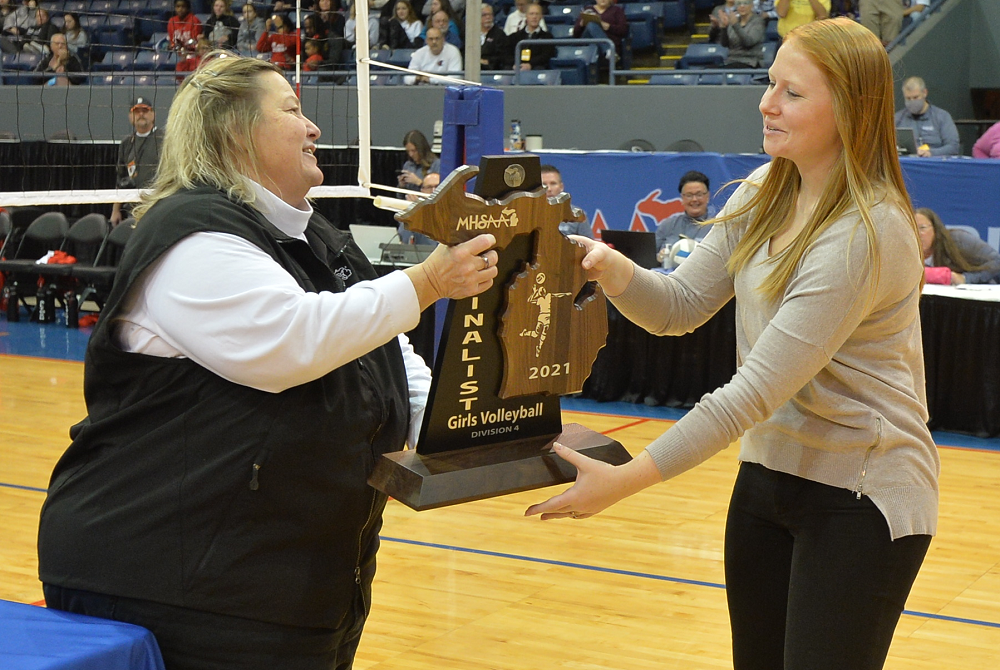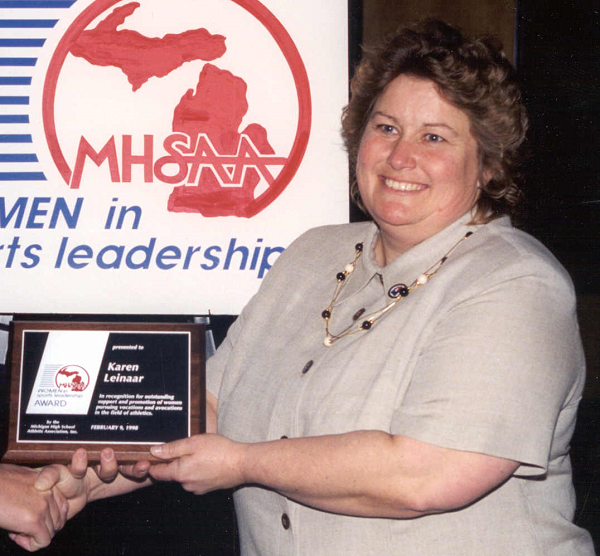
Thank Roosevelt for Football Weekends
December 20, 2013
By Rob Kaminski
MHSAA benchmarks editor
The next time you find yourself immersed in a tense crosstown football rivalry on a Friday night followed by a Saturday pilgrimage to the nearest college campus and a Sunday afternoon with a remote and your favorite snacks and beverages, take a moment to consider what the weekend would be like if it weren’t for Teddy Roosevelt.
The man who became our 26th President shortly after the turn of the 20th Century following the assassination of William McKinley in 1901 was a football fan like you. Maybe more so.
Today’s game of football has reached a critical crossroads. Player size and speed have increased across the board. Savage use of equipment as weapons rather than protective gear has been glorified on television networks and social media. Leaders of the game at all levels have recognized the need for change, employing new rules and widespread educational efforts to aid in preserving the sport.
History, as they say, is repeating itself.
In an ironic twist, it was Roosevelt who saved the then-brutally violent game of football from itself more than 100 years ago. Yes, the same “Rough and Ready Teddy” who led the charge up San Juan Hill during the Spanish-American War and often sparred in the boxing ring while in office from 1901-09 opined that football was becoming so gruesome that he delivered an ultimatum: clean up the game or it would be outlawed.
The Chicago Tribune reported that in 1904 alone, there were 18 football deaths and 159 serious injuries, mostly among prep school players. Football deaths suffered by younger players were reported on a nearly weekly basis, as outraged citizens called on colleges and high schools to banish football outright.
In stepped Roosevelt, who called head coaches and representatives from Harvard, Yale and Princeton – college powers at the time – to the White House in 1905 urging them to eliminate excessive violence and set an example of fair play for the rest of the country. When the casualties actually rose by one during the ensuing season, Roosevelt reacted with greater resolve and convened leading football authorities for the purpose of authoring drastic rules changes. What emerged was an intercollegiate conference which was the predecessor of the NCAA.
Among the most effective changes for the 1906 season were the legalization of the forward pass, the elimination of mass formations, and the creation of a neutral zone. Football fatalities fell to 11 in each of the next two seasons, and severe injuries fell drastically.
Thanks to the introduction of protective equipment and ever-evolving rules changes, football during the 100-plus years to follow has become an exponentially safer game. Yet, the game’s leaders always will need to adjust and react to scrutiny that comes with the territory.
So, as the game once again undergoes rules modifications in the name of safety, give a tip of the cap to President Roosevelt while you enjoy college bowl season and the NFL playoffs and begin to think ahead to the first high school practice of 2014.

2023 Forsythe Award Celebrates Leinaar's 40 Years Dedicated to School Sports
By
Geoff Kimmerly
MHSAA.com senior editor
March 8, 2023
Few people in Michigan have had a longer-lasting influence on the rules and policies of educational athletics than Frankfort’s Karen Leinaar, who has served in several roles locally, statewide and nationally over more than 40 years contributing to the school sports community.
Thank you, Bill Baker.
The longtime teacher, coach, principal and superintendent during a career that stretched across multiple schools – including Leinaar’s growing up, Delton Kellogg – made an impression on the standout multi-sport athlete before she graduated from high school in 1977. Baker’s philosophy and work led Leinaar to study education at Michigan State University and then brought her back as Delton’s athletic director to begin four decades of making the same impact on children in her hometown and eventually in hometowns all over Michigan and beyond.
Baker died in 2009, but not before continuing to mentor Leinaar through many good times and tough ones.
“The man had two daughters that I grew up with, his wife was a teacher, and he demonstrated to all of us – he never missed an event – that we were important to him. That even though we weren’t his kids, we were his kids and athletics was a way to help kids become better people – and for some kids it was the only thing that they had positive in their life,” Leinaar said. “And he made it known just to that individual kid how important their participation was and their involvement, and how that helped them become the person that they were.
“That to me was such an example of how to help people be good people, that I just took that role on.”
It’s a role in which she continues to serve. Leinaar began her career as an athletic administrator in 1982, and as the interim athletic director currently at Frankfort High School is serving her fifth district in that position. Since June 2019, she also has served as executive director of the Michigan Interscholastic Athletic Administrators Association (MIAAA), the professional organization for school sports administrators in the state with a membership of nearly 700.
 To recognize that longtime and continuing impact, Leinaar has been named the 2023 honoree for the Michigan High School Athletic Association’s Charles E. Forsythe Award.
To recognize that longtime and continuing impact, Leinaar has been named the 2023 honoree for the Michigan High School Athletic Association’s Charles E. Forsythe Award.
The annual award is in its 46th year and named after former MHSAA Executive Director Charles E. Forsythe, the Association's first full-time and longest-serving chief executive. Forsythe Award recipients are selected each year by the MHSAA Representative Council, based on an individual's outstanding contributions to the interscholastic athletics community.
Leinaar also served 22 years on the MHSAA’s Representative Council and a four-year term from 2009-13 on the Board of Directors for the National Federation of State High School Associations (NFHS), and just last week was named to the 2023 class of the National Interscholastic Athletic Administrators Association (NIAAA) Hall of Fame.
“It is impossible even to estimate the number of students, coaches, administrators and others who have been affected by the work Karen Leinaar has done to make school sports the best they can be – not only in her communities, but across Michigan and throughout the country,” MHSAA Executive Director Mark Uyl said. “There are few who have equaled her dedication and her support and promotion of the ideals of school-based sports. She has always placed an emphasis on being in the room, on the field or at the arena, actively participating in her leadership roles, and our programs are better for it.”
Leinaar first served as athletic director at Delton Kellogg for nearly 17 years, from March 1982 through October 1998. She spent three years at Gaylord, then 8½ at Benzie Central before taking over at Bear Lake in November 2010 and spending the next decade organizing athletic programs for students in grades 5-12 before retiring in January 2021. She came out of retirement to return to the athletic director’s chair this past fall as interim AD at Frankfort. She has completed nearly four years as MIAAA executive director, moving into that position after previously serving nine years as an assistant to the executive.
Leinaar began her service on the Representative Council in Fall 1999 and completed her last term as a statewide at-large representative at the Fall 2021 meeting.
She has been honored several times for her contributions. She received the MHSAA’s Women In Sports Leadership Award in 1998, a Citation from the NFHS in 2000, and she was named MIAAA Athletic Director of the Year in 2001. She received an MHSAA’s Allen W. Bush Award in 2014 – recognition given for work done generally behind the scenes and with little attention.
“This is the top of the mountain, per se. This one does mean so much,” Leinaar said of the Forsythe Award. “The names that are associated with this over the years, I never thought I’d be put in that group.”
Leinaar remains a continuous source of support at a multitude of MHSAA championship events, and during her time on Council was one of the most frequent representatives handing out trophies and medals to champions and runners-up at Finals events. She began while athletic director at Delton Kellogg hosting the MHSAA Volleyball Finals in Class B and Class C and continues to assist with those championships now played at Kellogg Arena in Battle Creek.
She also hosted Competitive Cheer Finals at Delton Kellogg in 1996 and 1997, Ski Finals while at Gaylord, and many more championship events across the Lower Peninsula. She continues to assist at the MHSAA’s Lower Peninsula Cross Country and Track & Field Finals.
After attending Delton Kellogg High School, Leinaar earned a bachelor’s degree in physical education, health and recreation, with a minor in driver education, from MSU in 1982. She completed a master’s in athletic administration from Western Michigan University in 1994.
Leinaar has been a member for 40 years of both the MIAAA and NIAAA, and has served as chairperson of the MIAAA Annual Conference and awards chairperson for both the state and national bodies. She’s also served as chairperson of the MIAAA’s Exemplary Athletic Program.
Past recipients of the Charles E. Forsythe Award
1978 - Brick Fowler, Port Huron; Paul Smarks, Warren
1979 - Earl Messner, Reed City; Howard Beatty, Saginaw
1980 - Max Carey, Freesoil
1981 - Steven Sluka, Grand Haven; Samuel Madden, Detroit
1982 - Ernest Buckholz, Mt. Clemens; T. Arthur Treloar, Petoskey
1983 - Leroy Dues, Detroit; Richard Maher, Sturgis
1984 - William Hart, Marquette; Donald Stamats, Caro
1985 - John Cotton, Farmington; Robert James, Warren
1986 - William Robinson, Detroit; Irving Soderland, Norway
1987 - Jack Streidl, Plainwell; Wayne Hellenga, Decatur
1988 - Jack Johnson, Dearborn; Alan Williams, North Adams
1989 - Walter Bazylewicz, Berkley; Dennis Kiley, Jackson
1990 - Webster Morrison, Pickford; Herbert Quade, Benton Harbor
1991 - Clifford Buckmaster, Petoskey; Donald Domke, Northville
1992 - William Maskill, Kalamazoo; Thomas G. McShannock, Muskegon
1993 - Roy A. Allen Jr., Detroit; John Duncan, Cedarville
1994 - Kermit Ambrose, Royal Oak
1995 - Bob Perry, Lowell
1996 - Charles H. Jones, Royal Oak
1997 - Michael A. Foster, Richland; Robert G. Grimes, Battle Creek
1998 - Lofton C. Greene, River Rouge; Joseph J. Todey, Essexville
1999 - Bernie Larson, Battle Creek
2000 - Blake Hagman, Kalamazoo; Jerry Cvengros, Escanaba
2001 - Norm Johnson, Bangor; George Lovich, Canton
2002 - John Fundukian, Novi
2003 - Ken Semelsberger, Port Huron
2004 - Marco Marcet, Frankenmuth
2005 - Jim Feldkamp, Troy
2006 - Dan McShannock, Midland; Dail Prucka, Monroe
2007 - Keith Eldred, Williamston; Tom Hickman, Spring Lake
2008 - Jamie Gent, Haslett; William Newkirk, Sanford Meridian
2009 - Paul Ellinger, Cheboygan
2010 - Rudy Godefroidt, Hemlock; Mike Boyd, Waterford
2011 - Eric C. Federico, Trenton
2012 - Bill Mick, Midland
2013 - Jim Gilmore, Tecumseh; Dave Hutton, Grandville
2014 - Dan Flynn, Escanaba
2015 - Hugh Matson, Saginaw
2016 - Gary Hice, Petoskey; Gina Mazzolini, Lansing
2017 - Chuck Nurek, Rochester Hills
2018 - Gary Ellis, Allegan
2019 - Jim Derocher, Negaunee; Fredrick J. Smith, Stevensville
2020 - Michael Garvey, Lawton
2021 - Leroy Hackley Jr., Byron Center; Patti Tibaldi, Traverse City
2022 - Bruce Horsch, Houghton
PHOTOS (Top) Karen Leinaar, left, awards the 2022 Division 4 volleyball finalist trophy to Indian River Inland Lakes coach Nicole Moore. (Middle) Leinaar accepts the MHSAA's Women In Sports Leadership Award in 1998.

